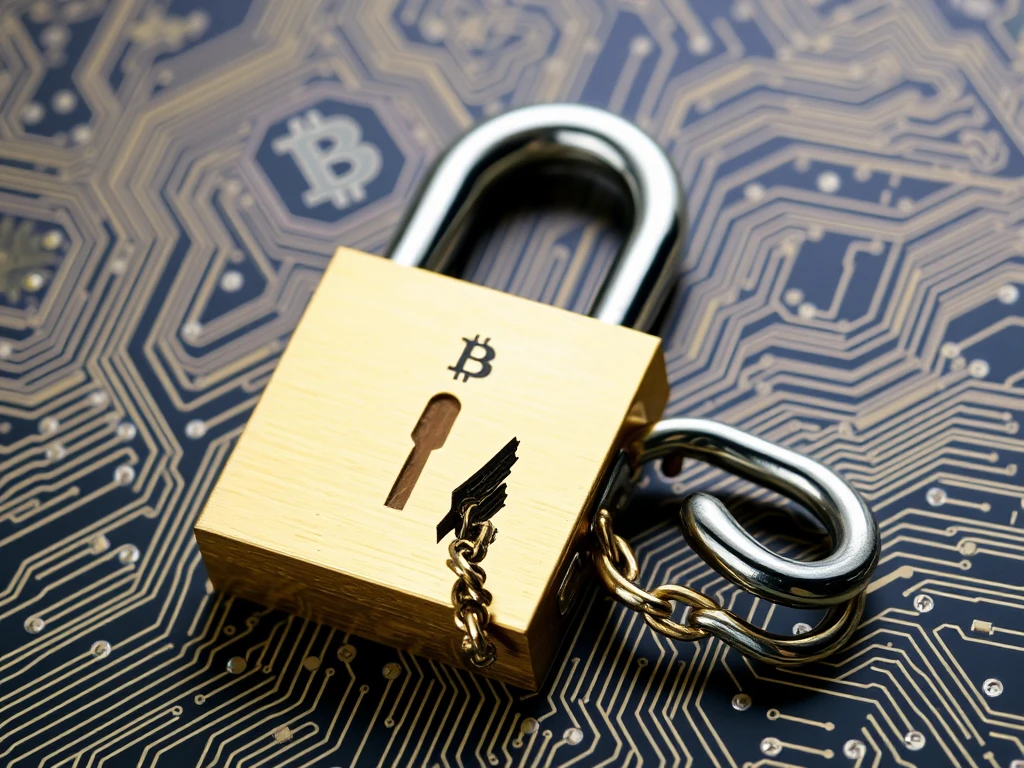Alarming $70 Million Crypto Theft Exposes Critical DeFi Security Flaws in UPCX Hack

In a shocking turn of events for the decentralized finance (DeFi) space, payment platform UPCX has become the latest victim of a massive crypto hack, with hackers siphoning off a staggering $70 million in digital assets. This incident, reported on April 1st, has sent ripples of concern throughout the crypto community, raising serious questions about DeFi security and the vulnerabilities inherent in even open-source platforms. Let’s dive into the details of this alarming UPCX hack and understand what it means for the future of crypto security.
What We Know About the $70 Million Cryptocurrency Theft
According to blockchain security firm Cyvers, the alarm bells rang when suspicious activity was detected involving 18.4 million UPC tokens. The estimated value of these tokens at the time? A hefty $70 million. Here’s a breakdown of how this cryptocurrency theft unfolded:
- Unauthorized Access: An unidentified attacker managed to gain unauthorized access to a UPCX address.
- ProxyAdmin Contract Upgrade: The hacker didn’t stop there. They proceeded to upgrade the platform’s ProxyAdmin contract. This is a critical component in smart contract systems, often used for managing and upgrading contracts.
- Admin Withdrawal Function Exploited: By manipulating the upgraded contract, the attacker executed a function designed for administrators to withdraw funds.
- Multiple Accounts Targeted: Funds were transferred from not just one, but three different management accounts, showcasing a coordinated and sophisticated attack.
- Tokens Untouched (For Now): As of the latest reports, the stolen tokens have not yet been swapped for other cryptocurrencies. This could be for various reasons, including attempts to avoid immediate detection or waiting for a more opportune moment to liquidate.
The implications of upgrading the ProxyAdmin contract are particularly concerning as it suggests a deep understanding of the platform’s architecture and security protocols. This wasn’t just a simple exploit; it was a targeted attack that leveraged administrative privileges within the system.
UPCX’s Response to the Security Breach
In the wake of this significant blockchain security breach, UPCX has taken swift action, albeit reactive. Here’s what we know about their response:
- Activity Suspension: UPCX has suspended all platform activity, indicating the severity of the situation and the need for a thorough investigation.
- Deposit and Withdrawal Freeze: Deposits and withdrawals for UPCX tokens have been halted to prevent further unauthorized transactions and to secure the remaining assets.
- Investigation Underway: The UPCX team has stated they are actively investigating the incident to determine the full extent of the breach and to identify the vulnerabilities exploited.
- User Funds Claimed Safe: Reassuringly, UPCX has stated that user assets are not affected by this particular incident. This suggests the stolen funds were from the platform’s operational or management reserves, not user wallets.
While the claim that user funds are safe is positive news, the incident still severely damages the platform’s reputation and raises questions about the overall security measures in place. The speed and effectiveness of their investigation will be crucial in regaining user trust.
Impact on UPCX Token Price
As expected, news of the UPCX hack had an immediate and negative impact on the price of the UPC token. Let’s look at the numbers:
- 7% Price Drop: The UPC token price experienced a significant 7% drop following the announcement of the unauthorized transfer.
- Price Range Shift: The price fell from a high of $4.06 to a low of $3.77 during the immediate aftermath of the news breaking.
- Market Volatility: This price dip underscores the volatile nature of cryptocurrency markets and how sensitive they are to security breaches and negative news.
This price fluctuation is a stark reminder of the risks associated with investing in cryptocurrencies, particularly those tied to platforms that experience security incidents. Investor confidence can be easily shaken, leading to rapid sell-offs and price declines.
What Does This Mean for DeFi Security?
The UPCX incident is not an isolated case; it’s part of a growing trend of DeFi security breaches that plague the cryptocurrency landscape. Here are some critical takeaways and questions that arise from this event:
- Smart Contract Vulnerabilities: Even with audits and security measures, smart contracts can still contain vulnerabilities that malicious actors can exploit. Regular and rigorous security audits are essential, but they are not foolproof.
- Centralization Risks in Decentralized Platforms: The ability to upgrade ProxyAdmin contracts and the existence of management accounts with significant withdrawal permissions highlight a degree of centralization, even in ‘decentralized’ platforms. This centralization can become a single point of failure.
- Open-Source Transparency vs. Security: While open-source platforms promote transparency, they also make the codebase publicly available for potential attackers to scrutinize for vulnerabilities. Balancing transparency with robust security is a continuous challenge.
- The Need for Enhanced Security Protocols: This hack underscores the urgent need for more sophisticated security protocols, proactive monitoring systems, and rapid incident response mechanisms in the DeFi space.
- Investor Awareness and Due Diligence: For investors, this incident serves as a crucial reminder to conduct thorough due diligence on platforms before investing, understanding the security risks involved, and diversifying their holdings.
Moving Forward: Enhancing Crypto Security Measures
The UPCX crypto hack is a stark wake-up call for the entire cryptocurrency industry. To prevent future incidents and build a more secure and trustworthy DeFi ecosystem, several steps are crucial:
- Advanced Security Audits: Implement more frequent and in-depth security audits conducted by reputable firms, focusing not just on code but also on operational security and access controls.
- Multi-Sig Governance: Adopt multi-signature governance models for critical functions like contract upgrades and fund withdrawals to reduce the risk of single-point compromises.
- Real-Time Monitoring and Alert Systems: Deploy advanced monitoring systems that can detect anomalous activities in real-time and trigger immediate alerts, allowing for faster incident response.
- Bug Bounty Programs: Encourage ethical hackers to identify vulnerabilities by implementing robust and well-incentivized bug bounty programs.
- Community Vigilance and Transparency: Foster a culture of security awareness within the crypto community and maintain transparency about security measures and incident responses.
Conclusion: A Critical Moment for DeFi
The $70 million cryptocurrency theft from UPCX is more than just another headline; it’s a critical moment for the DeFi sector. It underscores the persistent and evolving threats in the crypto space and highlights the absolute necessity for continuous improvement in DeFi security. While the promise of decentralization and financial innovation is immense, it must be built on a foundation of robust security and trust. The industry must learn from incidents like the UPCX hack and proactively implement stronger security measures to safeguard the future of decentralized finance and ensure user confidence in this revolutionary technology.









